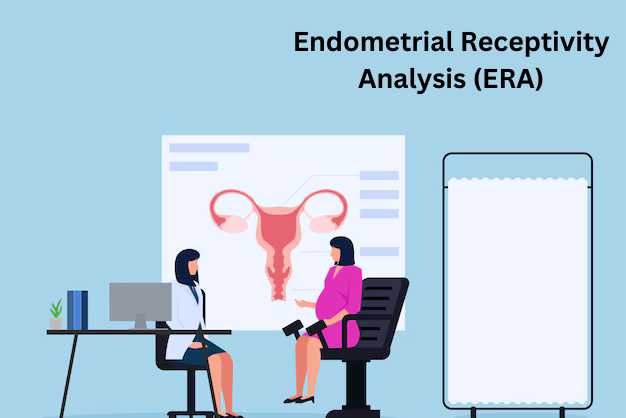Endometrial Receptivity Analysis (ERA)
Endometrial Receptivity Analysis (ERA) plays a crucial role in assisted reproductive technologies (ART) like IVF, ICSI, and FET. This advanced diagnostic tool helps ensure that the uterine lining is perfectly prepared to receive an embryo, increasing the chances of a successful pregnancy. At New World Fertility Centre in Delhi, we offer ERA at competitive rates to help our patients achieve their dreams of parenthood.
What is Endometrial Receptivity Analysis (ERA)?
ERA is a cutting-edge molecular diagnostic test designed to evaluate the receptivity of the endometrium, the lining of the uterus. By analyzing a biopsy sample from the endometrial lining, Endometrial Receptivity Analysis identifies the optimal timing for embryo transfer during an IVF cycle. This personalized approach helps determine the ideal window for embryo implantation, enhancing the chances of a successful pregnancy.
What Does Endometrial Receptivity Mean?
Endometrial receptivity refers to the endometrium's ability to support the attachment and growth of a blastocyst (embryo). For successful implantation and early pregnancy maintenance, the endometrium must undergo several histological changes, including increased thickness and appropriate hormonal responses.
Factors Affecting Endometrial Receptivity:
Several factors can influence endometrial receptivity, including:
Hormonal Imbalances: Proper synchronization of estrogen and progesterone is essential.
Endometrial Issues: Conditions such as excessive estrogen activity, abnormal endometrial thickness or pattern, and uterine abnormalities like polyps, fibroids, or adhesions can hinder receptivity.
Embryonic Defects: Chromosomal abnormalities in the embryo can also affect implantation success.
The ERA Procedure at New World Fertility Centre
The ERA procedure involves two key steps:
Prep or Mock Cycle: Patients take medications to stimulate the uterine lining, monitored through transvaginal ultrasounds and blood tests.
Biopsy and Gene Sequencing: A small tissue sample is collected from the endometrial lining during the mid-luteal phase. This sample undergoes gene expression analysis to determine receptivity.
The biopsy is a quick, painless outpatient procedure that typically takes only a few minutes. Results guide adjustments in progesterone administration and embryo transfer timing to enhance implantation chances.
Success Rate of ERA:
ERA significantly improves embryo implantation success rates, with a reported success rate of up to 95% in women with repeated implantation failures. While it offers the highest improvement for those with previous challenges, ERA can also benefit patients with generally favorable prognoses.
Who Should Consider ERA?
ERA is particularly beneficial for:
- Patients who have experienced multiple failed IVF, ICSI, or FET cycles.
- Women with recurrent miscarriages or pregnancy losses.
Cost of ERA:
At New World Fertility Centre, we offer ERA at a cost-effective rate, ranging from ₹35,000 to ₹50,000, which includes the prep cycle and biopsy. This is significantly lower than the costs in Western countries, making it a cost-efficient option for many patients. We encourage patients to discuss costs and insurance options with our team during a free consultation.
Enhancing Endometrial Receptivity Naturally:
While no activities are scientifically proven to improve endometrial receptivity directly, some practices may support uterine health:
- Stress Management: Reducing stress can improve overall reproductive health.
- Hormonal Balance: Maintaining balanced hormone levels through diet and medication.
- Diet: Consuming omega-3 fatty acids, found in oily fish, and increasing fruit intake can support endometrial health.
- Exercise: Regular physical activity, even simple walking, can contribute to a healthy endometrial lining.
Conclusion
Endometrial Receptivity Analysis (ERA) is an invaluable tool in ART, helping many patients overcome implantation failures and achieve successful pregnancies. At New World Fertility Centre in Delhi, we provide ERA at affordable rates and with expert care to support your journey to parenthood. If you are facing challenges with implantation or recurrent pregnancy loss, we recommend consulting with our specialists to explore how ERA can enhance your fertility treatment.
Contact New World Fertility Centre today to learn more about ERA and how we can help you achieve your fertility goals.
Frequently Asked Questions (FAQ)
1. What is Endometrial Receptivity Analysis (ERA)?
Endometrial Receptivity Analysis (ERA) is a diagnostic test used to assess the receptivity of the uterine lining for embryo implantation. By analyzing a biopsy sample of the endometrial lining, ERA identifies the optimal timing for embryo transfer during an IVF cycle, increasing the chances of a successful pregnancy.
2. How does ERA work?
ERA involves two main steps:
- Prep or Mock Cycle: Medications are administered to stimulate the uterine lining, monitored through ultrasounds and blood tests.
- Biopsy and Gene Sequencing: A small sample of the endometrial lining is collected and analyzed for gene expression to determine the best timing for embryo transfer.
3. Who should consider ERA?
ERA is ideal for:
- Patients who have experienced multiple failed IVF, ICSI, or FET cycles.
- Women with recurrent miscarriages or pregnancy losses.
4. What are the benefits of ERA?
ERA helps increase the chances of successful embryo implantation by identifying the optimal window for transfer. It is particularly beneficial for those with a history of implantation failures or recurrent miscarriages.
5. Is the ERA procedure painful?
The ERA biopsy is generally a quick and painless outpatient procedure. It typically takes only a few minutes and does not require sedation. Some patients may experience mild discomfort similar to menstrual cramps.
6. How long does it take to get results from ERA?
Results from the ERA procedure are usually available within a few weeks. The analysis helps determine if the endometrium is receptive and can guide adjustments in progesterone administration and transfer timing.
7. What factors can affect endometrial receptivity?
Factors affecting endometrial receptivity include hormonal imbalances, endometrial thickness, patterns, and abnormalities such as polyps, fibroids, or adhesions. Chromosomal abnormalities in the embryo can also impact receptivity.

 Aug-19-2025
Aug-19-2025